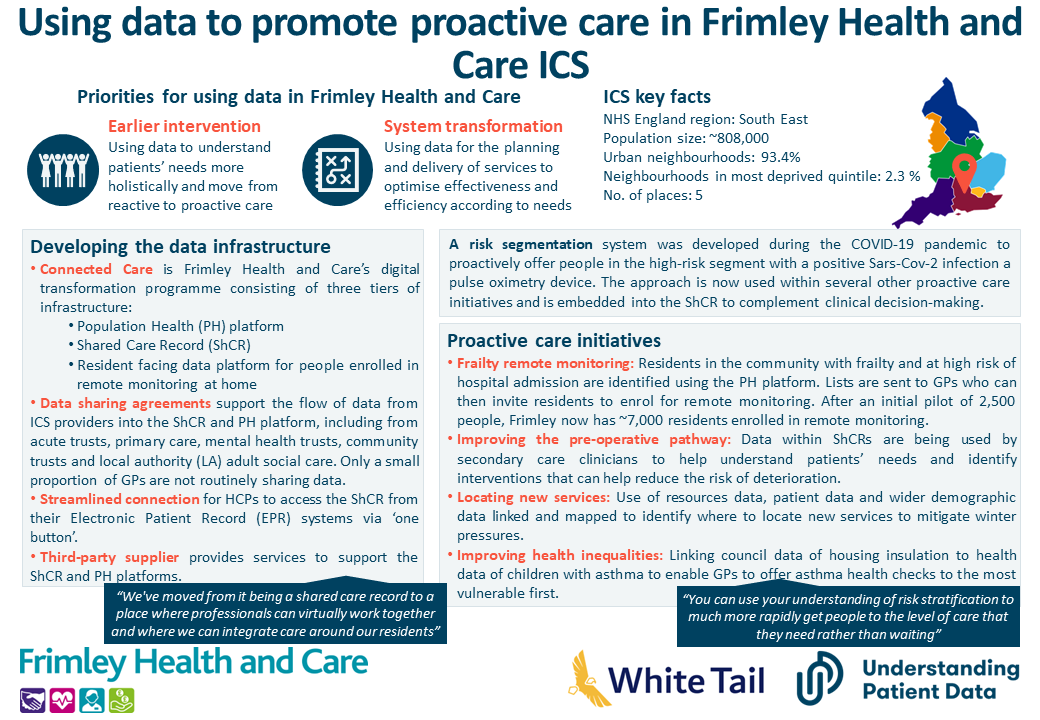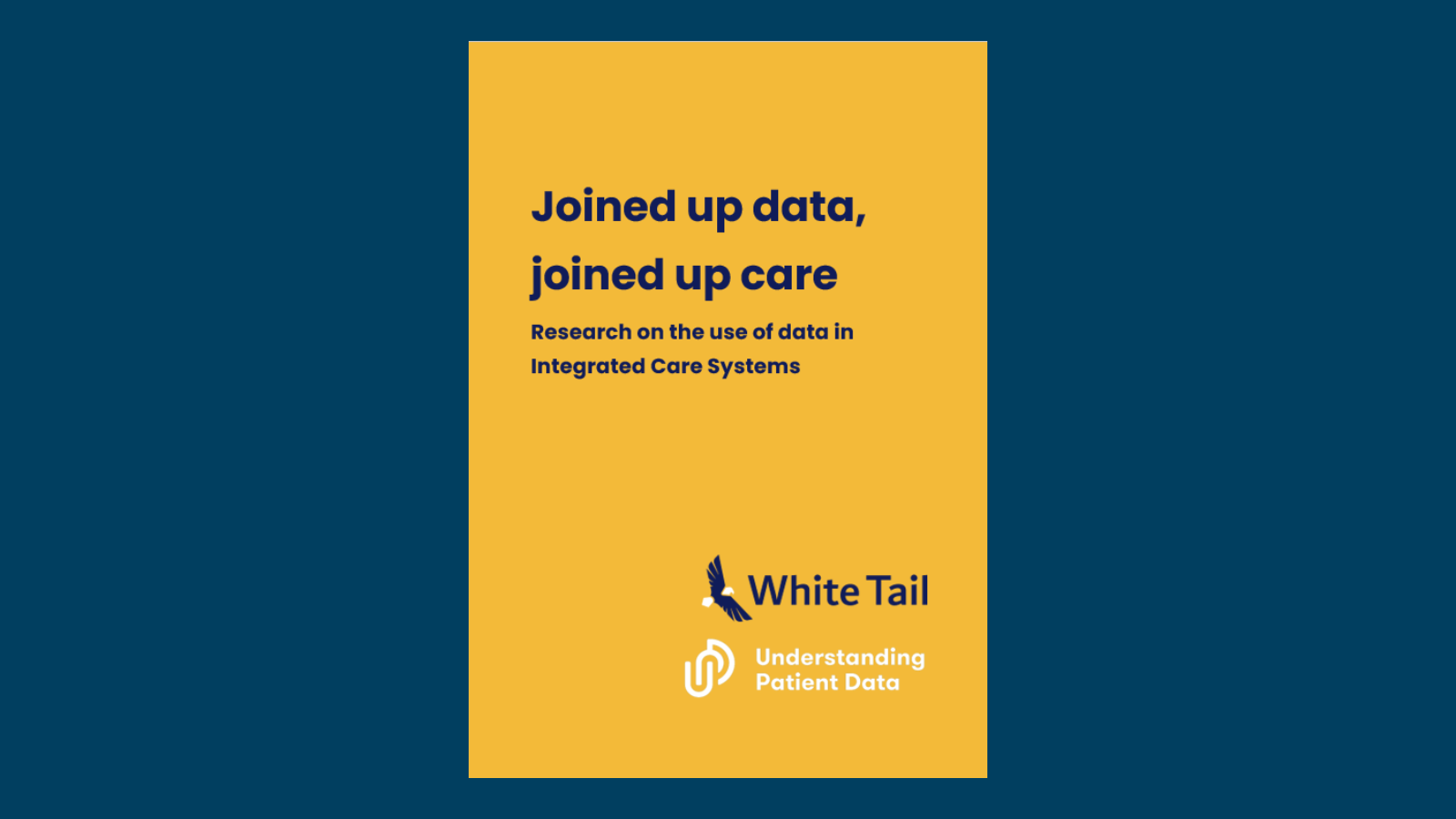Why we carried out this research
Following the Health and Care Act 2022, the English NHS was reconfigured into 42 Integrated Care Systems (ICSs) responsible for bringing together health and care organisations to deliver joined up care and improve population health across local areas. ICSs are made up of NHS organisations, local authorities, and other partners like voluntary, community and social enterprise (VCSE) organisations and social care providers.
The success of ICSs in delivering integrated care and improved health outcomes relies on effectively harnessing joined-up patient data, but recent digital maturity assessments show that there is large variation in how ICSs across the country are using data. We also understand that members of the public are more familiar with how GPs and hospitals use data but less familiar with other organisations that use patient data such as ICSs.
This research aims to help improve transparency and public understanding about how ICSs use data and provide insights to support ICS leaders and policymakers to improve the way patient data is collected, used and shared.
About the research
In collaboration with our hosts at the NHS Confederation, Understanding Patient Data commissioned White Tail Consulting to carry out this research. Following a literature review and the development of a set of research questions, they undertook an in-depth qualitative study of how ICSs use and share patient data, based on interviews with leaders in strategic and technical roles. The fieldwork was divided into two phases:
- Core interviews: Interviews with 23 participants across 11 ICSs formed the basis of our research report. Participants held roles such as Chief (Digital) Information Officer, Chief Medical Officer, and Chief Analytical Officer
- Case study interviews: We selected a subset of four of the participating ICSs to be explored in greater depth and inform the case studies. We undertook interviews with a further 21 participants in roles such as ‘information governance specialist’ and ‘public engagement lead’
Following the fieldwork, we held a virtual roundtable discussion with participants drawn from the fieldwork and other ICS data leaders to validate the findings and refine the report’s recommendations.
Our research sought to answer the following questions:
- What is the current state of sharing, accessing and using patient and other health and care service user data in ICSs?
- Looking beyond current priorities, what are the main opportunities for using patient and other health and care service user data in ICSs?
- What is the current state of sharing patient and other health and care service user data with organisations outside of the ICS, including national bodies (NHS England and DHSC), the Secure Data Environment network and other ICSs?
- What are ICS leaders’ perspectives on public and patient understanding of and attitudes about the use of patient data by ICSs?
Key findings
- There is significant variation in the maturity of data infrastructure, sharing and use
ICSs vary greatly in the extent to which they are currently linking and using data for purposes other than individual care. While some ICSs, or parts of ICSs, have large analytical datasets containing information from a range of sources – including primary, acute, community and mental health NHS providers and Local Authority social care data – others reported having no sustained linked dataset and limited flow of primary care data for analytical purposes.
This variation is mirrored in the size and nature of analytical teams, with larger and/or more developed ICSs having sizeable teams including some specialised data engineering and analytics roles, while others have small teams with very limited resource outside of performance reporting.
ICSs with advanced technical infrastructure are already realising benefits from sharing data for individual care and analytical purposes, for instance through advanced population health management enabling targeted interventions. There is a risk that this variation increasingly impacts on the quality of care and public health services available to citizens in different parts of England, exacerbating inequalities in quality of care as the NHS becomes more dependent on using data to deliver more effective, population health-driven models of care.
- Development of infrastructure and analytics has run ahead of organisational culture and the development of data skills and recruitment and retention of staff
Large parts of the analytical workforce, which for many years has mainly been tasked with operational analyses and reporting, will require continued upskilling in order to deliver new data functions, though there is great enthusiasm in the profession to make this transformation. Highly specialised roles, such as advanced data engineers and analysts are currently challenging to recruit and retain within current NHS roles and pay structures, such that a separate approach may be required to ensure the NHS acquires and retains sufficient expertise in modelling and data management.
A further challenge exists around organisational culture and the wider use of data in decision making and care planning, particularly for those in non-data roles. Technical advancement has tended to outstrip ICSs’ abilities to utilise insights generated by the new possibilities of data. Although there are areas of impressive, transformational work, wider realisation of the possibilities of data will require greater understanding, technical skills and confidence in the use of data by leaders, managers and clinicians.
- ICSs perceive challenges balancing the demands of national policymakers and a lack of clarity about long-term plans for the use of data in the NHS
Participants reported a perceived lack of clarity from national policymakers about the long-term vision for ICS data use, with encouragement to develop local population health capabilities at times feeling in conflict with national plans to roll-out the Federated Data Platform, with this perceived lack of clarity causing them to pause on investment decisions, therefore leading to stasis.
ICSs also experience challenges balancing the ongoing demand from the centre for performance and operational data with the need to carve out time for improving the use of patient data for analytical purposes, with one participant stating “The churn, the must dos, the asks, et cetera from the centre always trump other elements […] So I tend to be sort of 70 to 80% operational stuff and 20% the strategic stuff unfortunately.” This was particularly a challenge for ICSs with smaller data teams and less capacity to focus on innovative uses of data to drive improvements in population health. There was a recognition that the roll-out of the Federated Data Platform may be able to help automate some of these requests, freeing up capacity.
- All of the ICSs we spoke to recognised the importance of engaging with patients and the public on their use of data, but believe they need to do more in this area
The public has an important voice in this debate, and ICSs acknowledged that public understanding of uses of data is low and trust in data sharing practices can be fragile. While some ICSs have done targeted engagement to support specific information governance activities, on the whole there is a perception that much more needs to be done to achieve public support in this area.
Whilst participants all agreed that ICSs have a responsibility for engaging with the public when it comes to local initiatives, there were mixed views on where responsibility should lie when it comes to issues that affect all ICSs. Some felt that there should be more coordination between national initiatives and ICSs on engaging with the public on issues that affect all systems, such as the use of Shared Care Records or the use of linked data for population health analysis and that duplication of effort should be avoided. Others felt that the ICSs should always lead this work at the local level and that the differences in populations and needs across the country mean that national engagement is not always representative.
- There is a great deal of good practice in ICSs’ use of data, and systems perceive an opportunity and a desire to support one another and drive improvements to unlock the benefits of using data at the ICS level
Participants felt that the knowledge developed by more digitally mature ICSs, and the opportunity to develop relationships between ICSs, offered the potential for peer-learning and improvement at a national level.
Some areas of good practice shared by participants included:
- approaches to organising analytical teams, such as investing in data managers to curate and maintain datasets, and protecting strategic analytical teams from operational reporting demands;
- approaches to providing analytical support to ICS programme priorities and/or to place-based teams;
- approaches to developing self-services analysis and reporting tools; and
- development of data strategies in alignment with wider ICS plans and priorities.
Recommendations
![Blue background with text "Policy makers should... 'Support ICSs to engage with patients and members of the public on uses of data [...] and ensure that local engagement is guided and informed by national and regional public engagement activities, such as the large-scale public deliberation and the forthcoming data pack'"](/sites/default/files/2024-06/Recommendation%201%20v2.png)
Following the fieldwork phase, we worked with White Tail Consulting to develop a series of 17 recommendations for policymakers about the use and sharing of data by ICSs.
The recommendations cover topics on public engagement and understanding, the relationship between national and local systems and organisations, quality improvement, information governance, data quality, the supplier marker, workforce, and cultural change.
Case studies

As part of this research project, we worked with four ICSs that have in place advanced systems for using patient data. We conducted additional interviews with staff from a wider range of roles to get a more in-depth understanding of how they are using patient data.
These case studies give a brief, two-page overview of how these particular ICSs have developed their data functions, what has worked well, and what impact this is having at a local level on patient care.
We'll be publishing these case studies throughout 2024.
Using data to promote proactive care in Frimley Health and Care gives an overview of Frimley Health and Care’s data-driven risk segmentation system which is used in a number of proactive care initiatives.
Dorset Intelligence and Insight Service on Dorset ICS's integrated information system.
How does my ICS use my data? Plain English summary
Information about how ICSs and other NHS organisations use patient data can be difficult to find, or filled with jargon that is not always accessible to members of the public. To make it easier to understand how the NHS uses your data to improve services regionally and locally, we created a plain English summary of what ICSs are, how they use data and what our research found, along with tangible examples from our case studies of how data has been used to improve care in these areas.
Download the research
Next steps
UPD will share the findings from this research widely with people working on the use of health data in ICSs to help share best practice examples of good use of patient data. We will also share it with policymakers working on the use of patient data in England, including in the NHS and civil service, to influence policymaking in this area. Additionally, we think this research is useful for healthcare organisations, members of the wider data community, and other policy stakeholders such as patient advocacy groups and think tanks, across the UK and internationally.
We will also be thinking about how we can take the findings and recommendations forward, particularly to help improve patient and public involvement and engagement in ICSs use of data.
If you have any questions about this work, or would like to discuss the topic further, please email us at hello@understandingpatientdata.org.uk.

